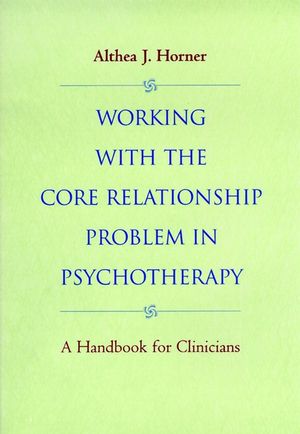Working with the Core Relationship Problem in Psychotherapy: A Handbook for CliniciansISBN: 978-0-7879-4301-1
Hardcover
224 pages
August 1998, Jossey-Bass
 This is a Print-on-Demand title. It will be printed specifically to fill your order. Please allow an additional 10-15 days delivery time. The book is not returnable.
|
||||||
"In this important book, Dr. Althea Horner, a remarkably skilled
theoretician, continues to expand her developmental object
relational model, a perspective that is solidly grounded in very
recent findings in developmental psychopathology and neurobiology.
But in addition, as a master clinician, she then demonstrates how
an understanding of early- forming core relationship problems can
offer penetrating insights into working with characterological
disturbances. Due to her integrative contributions and
extraordinary ability to explain complex clinical phenomena in
clear and accessible language, I highly recommAnd this book to
therapists of all persuasions." --Allan N. Schore, department of
psychiatry and biobehavioral sciences, University of California at
Los Angeles School of Medicine
"Once again, Althea Horner demonstrates that she is a master of the theory and practice of psychodynamic psychotherapy. In her latest book, Horner goes directly to the heart of the treatment. She clarifies the importance of identifying the core relationship problem early in treatment as it is the organizing principle for understanding the many layers of adaptive/defensive elaboration that accrue over the years. . . .The Core Relationship Problem in Psychotherapy is full of material that all clinicians--beginner and seasoned practitioners alike--will find thought provoking and rewarding." --Marion Solomon, author of Narcissism and Intimacy
"A testament to concision, wisdom, and instruction in psychotherapy. . . . My own experiences with patients flickered constantly through my thoughts as I read, and I was pleased to find new insights into clinical encounters about which I had previously been complacent. The handling of specific. . . . clinical issues all are considered with nondogmatic sensitivity." --Douglas H. Ingram, dean, American Institute for Psychoanalysis and clinical professor of psychiatry, New York Medical College
"Dr. Horner does it again! Her clear, concise style and compassionate tone draws the reader effectively through an education in the theory, art, and practice of psychodynamic psychotherapy, utilizing the core conflictual model. Every aspect of this most difficult of professions is elucidated by a elegant and common sense approach that leaves the student of psychotherapy with the feeling of having been touched by a master clinician." --William H. Rickles, M.D., private practice, Los Angeles, CA
"Once again, Althea Horner demonstrates that she is a master of the theory and practice of psychodynamic psychotherapy. In her latest book, Horner goes directly to the heart of the treatment. She clarifies the importance of identifying the core relationship problem early in treatment as it is the organizing principle for understanding the many layers of adaptive/defensive elaboration that accrue over the years. . . .The Core Relationship Problem in Psychotherapy is full of material that all clinicians--beginner and seasoned practitioners alike--will find thought provoking and rewarding." --Marion Solomon, author of Narcissism and Intimacy
"A testament to concision, wisdom, and instruction in psychotherapy. . . . My own experiences with patients flickered constantly through my thoughts as I read, and I was pleased to find new insights into clinical encounters about which I had previously been complacent. The handling of specific. . . . clinical issues all are considered with nondogmatic sensitivity." --Douglas H. Ingram, dean, American Institute for Psychoanalysis and clinical professor of psychiatry, New York Medical College
"Dr. Horner does it again! Her clear, concise style and compassionate tone draws the reader effectively through an education in the theory, art, and practice of psychodynamic psychotherapy, utilizing the core conflictual model. Every aspect of this most difficult of professions is elucidated by a elegant and common sense approach that leaves the student of psychotherapy with the feeling of having been touched by a master clinician." --William H. Rickles, M.D., private practice, Los Angeles, CA



